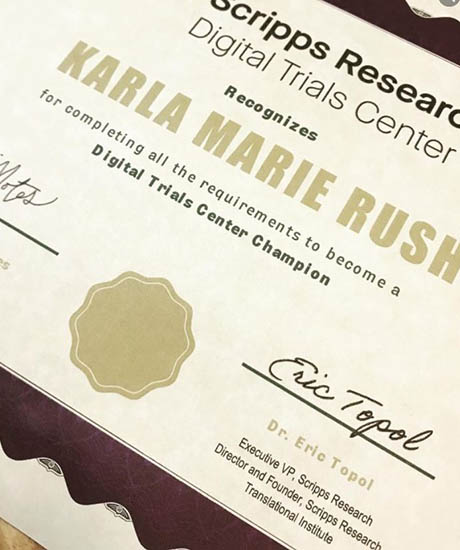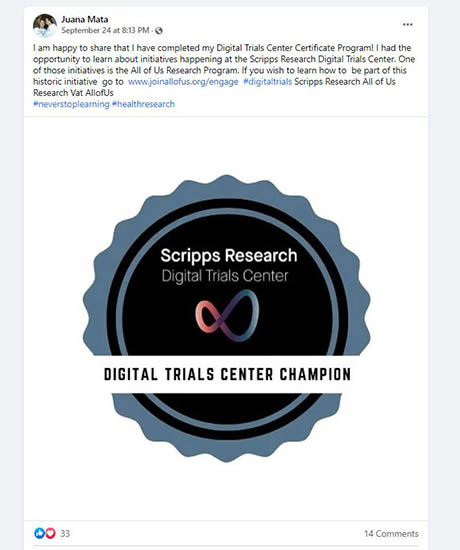Authors: Charu Balamurugan, David A. Rodriguez, Gayle Valensky, Lauren Serpico & Jeff Pawelek –
Offering incentives is one way to motivate people to take part in clinical research studies. An incentive can boost initial interest to enroll (recruitment) and help with long-term engagement (retention), and can be offered in various forms depending on the nature of the study such as points or rewards, branded promotional items, remuneration or some form of recognition to demonstrate appreciation for participants’ contributions.

The value of incentives can be perceived in different ways. While the most common incentive is cash, incentives can also focus on personal, social or professional recognition, which may offer a more meaningful and lasting effect for some people.
The Scripps Research Digital Trials Center (DTC) took a fresh approach to community engagement by creating the DTC Certificate Program (DTC-CP). The program is aimed at strengthening the relationship between the DTC and the community as well as give something back to prospective and current research participants. The DTC-CP is an online course designed to educate the public about cutting edge health research and how digital clinical trials can help researchers better understand chronic and acute health conditions outside of the traditional health system using remote monitors and wearable sensors.
Those taking part in the program receive a signed certificate by Dr. Eric Topol, the Director and Founder of Scripps Research Translational Institute and Katie Baca-Motes, Senior Director of Strategic Initiatives. To earn the certificate, participants complete five modules that cover the history of health research, along with the functions and goals of the DTC in general. They also receive a digital badge for use on social media platforms to show their commitment to learning more about health science. Some of the graduates included the program certificate on their resume in pursuit of future employment or higher education.


To date, over 90 people have completed the program, ranging in age from 18 to over 60 years old and representing a variety of racial/ethnic backgrounds and gender identities. Members of the DTC Virtual Advisory Team (“VAT”) were among the early program testers and provided valuable feedback that improved the current version. Of the program graduates, 85% did not have a prior relationship with the DTC, demonstrating the program’s effectiveness of forging new partnerships with members of the community.

The program is currently in a pilot phase and welcoming new participants (as of June 2022). Anyone in the U.S. can join and those interested in being a part of the pilot program can enroll by visiting the DTC-CP platform.*
Finding unique ways to offer high-impact social incentives could lead to long-term engagement and more meaningful partnerships between the community and researchers. Participants who completed the DTC-CP were much more likely to recommend the program to others and felt a greater return of value from the DTC as a whole according to a small survey of those who received the certificate.
In order to fulfill the goal of treating participants as partners, researchers should look beyond monetary incentives. Providing lasting value to the community involved in the study will not only show sincere commitment, but promotes a lasting relationship that elevates research from its often transactional nature.
We would like to thank Maribel Pieters, Project Coordinator, for all of her efforts in coordinating administrative tasks for the program.
*Footnote: A Google account is required to enroll into the program.



